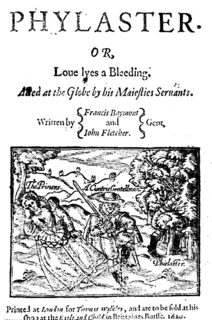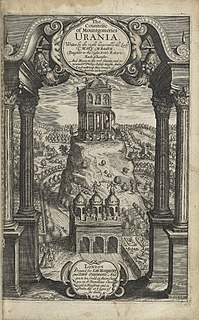
The Scornful Lady is a Jacobean era stage play, a comedy written by Francis Beaumont and John Fletcher, and first published in 1616, the year of Beaumont's death. It was one of the pair's most popular, often revived, and frequently reprinted works.

The Scornful Lady is a Jacobean era stage play, a comedy written by Francis Beaumont and John Fletcher, and first published in 1616, the year of Beaumont's death. It was one of the pair's most popular, often revived, and frequently reprinted works.
The title page of the 1616 first edition states that the play was premiered by the Children of the Queen's Revels; it later passed into the possession of the King's Men, who revived the play in 1624. [1] (The company's clown, John Shank, played the Curate in their 1624 production.) The King's Men acted The Scornful Lady on 19 October 1633, when Sir Henry Herbert, the Master of the Revels, refused to let them perform The Woman's Prize. Prince Charles, the future King Charles II, attended a performance of the play at the Cockpit-in-Court Theatre on Twelfth Night, 6 January 1642.
While the theatres were closed during the English Civil War and the Interregnum (1642–60), material was extracted from The Scornful Lady to form a droll called The False Heir and Formal Curate, published by Kirkman in The Wits.
The play was revived early in the Restoration and became a standard in the repertory. In his Diary, Samuel Pepys recorded seeing it on 27 November 1660 and on 4 January 1661, both times with male actors in the title role, as was standard up to that time. Then Thomas Killigrew staged the play with women in the female parts; Pepys saw that production on 12 February 1661. Pepys saw the play again on 27 December 1666, 16 September 1667, and 3 June 1668. Charles Hart and Edward Kynaston were among the actors of the day who played in it. [2] The Scornful Lady remained in the repertory until the middle of the 18th century. [3] Some early actresses acquired reputations for their work in the play; Anne Marshall was noted for her portrayal of the title character in the 1660s, while in the next century Mrs. Macklin, the wife of Charles Macklin, was a popular success as the servant Abigail.
The play was entered into the Stationers' Register on 19 March 1616; both the Register entry and the first edition assign the play to Beaumont and Fletcher. Cyrus Hoy, in his survey of authorship problems in the canon of Fletcher and his collaborators, produced this breakdown in the two writers' contributions: [4]
Hoy's schema is in general agreement with the work of earlier researchers. [5] A few early critics suggested the participation of Philip Massinger, though that possibility has generally been rejected due to lack of evidence. Based on references and allusions to contemporary events, scholars generally date the play to the 1613–16 period, though dates as early as 1610 have also been proposed. [6] [7] [8]
The Scornful Lady participates in a complex inter-relationship with several other plays of its era, a set of dramas that includes Marston's The Dutch Courtesan, Fletcher and Massinger's The Little French Lawyer, Massinger's The Parliament of Love, and A Cure for a Cuckold by John Webster and William Rowley. [9] All the plays exploit the idea of a woman who wants her beloved to duel with and kill his closest friend.
The play went through multiple editions in the 17th century, leaving it with a complex publication history. [10]
Subsequent editions followed in the 18th century. Like other already-published Beaumont/Fletcher plays, The Scornful Lady was omitted from the first Beaumont and Fletcher folio of 1647, but was included in the second folio of 1679.
Thomas Shadwell borrowed from the Beaumont/Fletcher play for his own The Woman-Captain (1680), [11] which was revived in 1744 as The Prodigal.
Rollo Duke of Normandy, also known as The Bloody Brother, is a play written in collaboration by John Fletcher, Philip Massinger, Ben Jonson and George Chapman. The title character is the historical Viking duke of Normandy, Rollo. Scholars have disputed almost everything about the play; but it was probably written sometime in the 1612–24 era and later revised, perhaps in 1630 or after. In addition to the four writers cited above, the names of Nathan Field and Robert Daborne have been connected with the play by individual scholars.

Francis Beaumont was a dramatist in the English Renaissance theatre, most famous for his collaborations with John Fletcher.

Beaumont and Fletcher were the English dramatists Francis Beaumont and John Fletcher, who collaborated in their writing during the reign of James I (1603–25).

John Fletcher (1579–1625) was a Jacobean playwright. Following William Shakespeare as house playwright for the King's Men, he was among the most prolific and influential dramatists of his day; during his lifetime and in the early Restoration, his fame rivalled Shakespeare's. He collaborated on writing plays with Francis Beaumont, and also with Shakespeare on two plays.
Cupid's Revenge is a Jacobean tragedy written by Francis Beaumont and John Fletcher. It was a popular success that influenced subsequent works by other authors.
The Beaumont and Fletcher folios are two large folio collections of the stage plays of John Fletcher and his collaborators. The first was issued in 1647, and the second in 1679. The two collections were important in preserving many works of English Renaissance drama.

Philaster, or Love Lies a-Bleeding is an early Jacobean era stage play, a tragicomedy written by Francis Beaumont and John Fletcher. One of the duo's earliest successes, the play helped to establish the trend for tragicomedy that was a powerful influence in early Stuart-era drama.
The Honest Man's Fortune is a Jacobean era stage play, a tragicomedy written by Nathan Field, John Fletcher, and Philip Massinger. It was apparently the earliest of the works produced by this trio of writers, the others being The Queen of Corinth and The Knight of Malta.
The Queen of Corinth is a Jacobean era stage play, a tragicomedy in the canon of John Fletcher and his collaborators. It was initially published in the first Beaumont and Fletcher folio of 1647.

The False One is a late Jacobean stage play by John Fletcher and Philip Massinger, though formerly placed in the Beaumont and Fletcher canon. It was first published in the first Beaumont and Fletcher folio of 1647.
The Lovers' Progress, also known as The Wandering Lovers, or Cleander, or Lisander and Calista, is an early seventeenth-century stage play, a tragicomedy written by John Fletcher and Philip Massinger. As its multiple titles indicate, the play has a complex history and has been a focus of controversy among scholars and critics.
The Elder Brother is an early seventeenth-century English stage play, a comedy written by John Fletcher and Philip Massinger. Apparently dating from 1625, it may have been the last play Fletcher worked on before his August 1625 death.
The Spanish Curate is a late Jacobean era stage play, a comedy written by John Fletcher and Philip Massinger. It premiered on the stage in 1622, and was first published in 1647.
Wit Without Money is a Jacobean era stage play, a comedy written by John Fletcher, and first published in 1639.
Beggars' Bush is a Jacobean era stage play, a comedy in the canon of John Fletcher and his collaborators that is a focus of dispute among scholars and critics.
Love's Pilgrimage is a Jacobean era stage play, a tragicomedy by Francis Beaumont and John Fletcher. The play is unusual in their canon, in that its opening scene contains material from Ben Jonson's 1629 comedy The New Inn.
The Coxcomb is an early Jacobean era stage play, a comedy written by Francis Beaumont and John Fletcher. It was initially published in the first Beaumont and Fletcher folio of 1647.
The Noble Gentleman is a Jacobean era stage play, a comedy in the canon of John Fletcher and his collaborators that was first published in the first Beaumont and Fletcher folio of 1647. It is one of the plays in Fletcher's canon that presents significant uncertainties about its date and authorship.
The Loyal Subject is a Jacobean era stage play, a tragicomedy by John Fletcher that was originally published in the first Beaumont and Fletcher folio of 1647.

Augustine Matthews was a printer in London in the Jacobean and Caroline eras. Among a wide variety of other work, Matthews printed notable texts in English Renaissance drama.